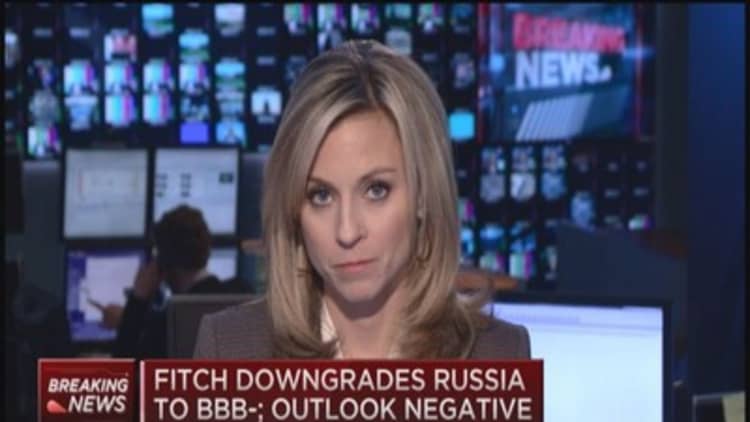A four-way summit aimed at ending military tensions on the borders of Ukraine looked to be in doubt on Monday, as German Chancellor, Angela Merkel, warned of a lack of progress from Russia.
Foreign ministers from France, Russia, Ukraine and Germany are due to meet in Berlin on Monday, but talks between the country's leaders – slated for Thursday -- look to have stalled.
It comes after a phone call between the German leader and her Russian counterpart Vladimir Putin on Sunday. Merkel told Putin that she was concerned about the persistent tensions and humanitarian situation in eastern Ukraine, according to a statement by German government spokesman Steffen Seibert.
Kiev and pro-Russia rebels had agreed on a peace plan for the conflict in September, but Merkel warned that she wanted to see concrete progress. She urged Russia to use its influence on the separatist rebels in the region to help resolve the tensions.
The Russian ruble sank around 2.5 percent against the U.S. dollar on Monday morning, with the greenback appreciating to around 62.8000 by 8:30 GMT. On Friday, the ruble closed at 61.2800 against the dollar, as credit rating agency Fitch downgraded Russia's credit rating to a BBB- with a negative outlook.
Despite the gloom, Bob Parker, a senior investment, strategy and research advisor at Credit Suisse, said he believes 2015 could see a cooling of tensions between Russia and Ukraine, and a stabilization in the ruble.
"Perhaps I'm being naive, but I'm assuming that this sort of dispute between Russia and Ukraine is now going to calm down and there's an economic factor behind that," he told CNBC Monday, adding that a contracting Russian economy would force Putin's hand.
For exporters, he said, the ruble's current levels were very favorable, as a weak ruble makes exports cheaper in the global market.
"The crisis – the selling pressure on the ruble -- I think is now behind us. I think we now stabilize," he said.
since the start of 2014, while the Ukrainian hyrvnia has lost 92 percent since the same date.
Ukraine was thrown into turmoil at the start of last year, after protests between anti-government and pro-EU demonstrators led to a change of leadership. Tensions on the streets of Kiev turned into military conflicts on the eastern border, with Moscow accused of aiding pro-Kremlin rebels in the region.

From mid-April to mid-December last year, over 4,700 people were killed and 10,300 were wounded in the fighting, according to the latest statistics by the United Nations.
Russia annexed the southern Ukrainian area of Crimea in March 2014 and, as a result, has faced tough economic sanctions from Western nations. These sanctions have hit the country's economy hard, along with a dramatic fall in the price of oil which Russia remains heavily reliant on for revenues.
Like Credit Suisse's Parker, analysts at Renaissance Capital weren't wholly pessimistic on a Russian turnaround.
In a research note on Monday, the investment banking firm urged clients to position themselves in the second half of this year for economic growth in Russia in 2015.
However, it said this only applied to investors willing to look through the current high-risk/high-uncertainty period.
"Our analysis suggests that Russian oil and gas stocks are not pricing in an oil price recovery and organic earnings growth in 2016," the firm said in a note on Monday. "Our top picks are Lukoil, Gazprom Neft and Tatneft."
Russia's gross domestic product rose 0.7 percent in the third quarter of 2014, compared to the same period in 2013, but Moscow officials are now predicting that the recession for Russia this year could mean growth contracting by around 4 or 5 percent.
Follow us on Twitter: @CNBCWorld


